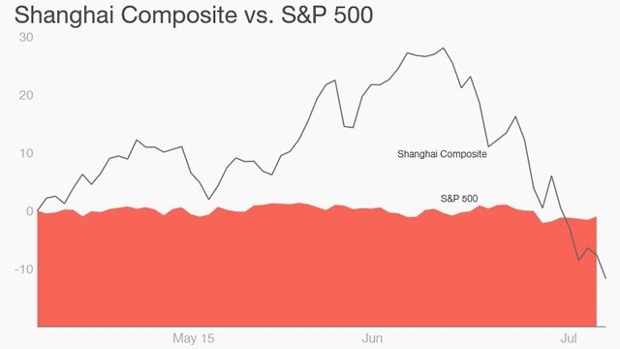-
Tips for becoming a good boxer - November 6, 2020
-
7 expert tips for making your hens night a memorable one - November 6, 2020
-
5 reasons to host your Christmas party on a cruise boat - November 6, 2020
-
What to do when you’re charged with a crime - November 6, 2020
-
Should you get one or multiple dogs? Here’s all you need to know - November 3, 2020
-
A Guide: How to Build Your Very Own Magic Mirror - February 14, 2019
-
Our Top Inspirational Baseball Stars - November 24, 2018
-
Five Tech Tools That Will Help You Turn Your Blog into a Business - November 24, 2018
-
How to Indulge on Vacation without Expanding Your Waist - November 9, 2018
-
5 Strategies for Businesses to Appeal to Today’s Increasingly Mobile-Crazed Customers - November 9, 2018
China stocks jump again as emergency measures bite
President Xi Jinping’s government is deploying the heavy hand of the state to prevent falling stock prices from eroding confidence in his leadership.
Advertisement
About half of the 2,800 stocks on mainland Chinese markets have been suspended from trading as companies attempt to stem further losses by sitting out the market upheaval.
Asian stock markets advanced early Friday, as the market rebound in China stayed on course for a second consecutive session. China’s Shanghai Composite closed up 4.5 percent, but remains 34.85 percent off its peak on June 12.
In the H-share market, or Chinese companies listed in Hong Kong, “market valuation has priced in the worst scenario”.
Beijing in the past two weeks has cut key interest rates, eased restrictions on stock purchases, and ordered large shareholders not to sell shares for the next six months. Trading suspensions tend to slow market activity and defer risk until later. Instead of stabilizing the market, they could add to the selling pressure by transferring it to other shares that remain active.
Credit Suisse analyst Michael Wan said: “If this continues unchecked, there may be a negative wealth effect as the dominant retail investor base in China loses money”.
Ordinary Chinese investors have mixed feelings about the trading halts.
Official Chinese media were quick to praise the government’s measures, which also included ordering state-run banks, big state companies, and China’s largest brokerages to buy shares – or at least not to sell until the market had risen significantly. However, a rise in yields since January has made utility stocks seem less attractive.
There’s economic reality. Then there’s the Chinese stock market. Kerry Brown, head of the China Studies Center at the University of Sydney, wrote this week that significant losses by the middle classes, on a market that the government has talked up repeatedly over the past half year, could be “potentially calamitous”, and lead to a “crisis of faith” among some of China’s most aspirational and entrepreneurial citizens.
That was the case in the 2007-08 market boom and bust, in which China’s stock market plunged 70 percent.
Investors who borrow money from brokerages have amplified the boom-and-bust.
Meanwhile, Greece offered new measures including a tax hike on shipping companies in the latest proposal sent to creditors on Thursday, as Athens raced against the clock to win new financial aid.
Only six stocks fell on Friday, while shares of 1,452 listed companies rose, majority hitting the upward limit of 10 percent. Hong Kong’s benchmark tumbled as much as 8.5 percent Wednesday.
Nevertheless, there is plenty of anecdotal evidence of young investors with short memories surging into the market – more than 12 million new trading accounts were opened in May alone. The objective is to bring the Communist country’s financial market practices in line with those of the rest of the world. “Anything you hold could be frozen at an unrealistic level and you can’t get out”.
Even so, Dr. Mao says, the “hangover” in China is likely to last for an extended period of time as deleveraging of the market proceeds. “And there really isn’t”, he said.
Advertisement
Yang Tao, a researcher with the Institute of Finance and Banking under the Chinese Academy of Social Sciences, said the drastic ups and downs in the stock market were partly due to the herd mentality of China’s retail investors, which constitute over 80 percent of turnover, whereas in more mature markets, institutional investors dominate. While the U.K.’s FTSE 100 Index has surged up by 1.2 percent, the German DAX Index and the French CAC 40 Index are up by 2.6 percent and 2.9 percent, respectively. But economists don’t expect the market meltdown to do much damage to the real economy.





























